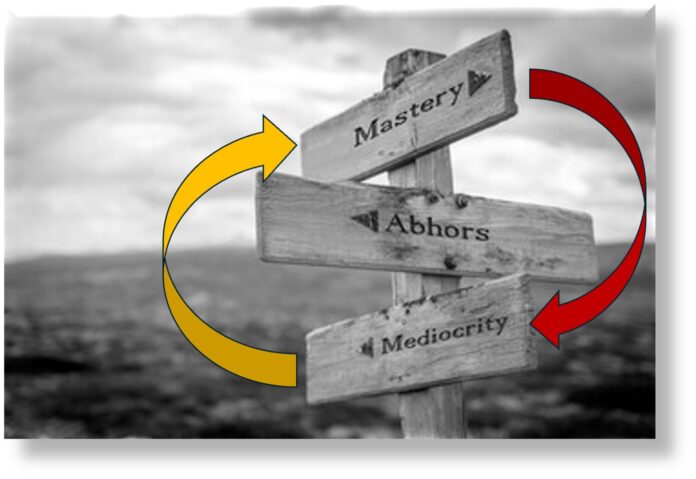The Magic of Mediocrity
A World Where Confidence Meets Complete Cluelessness
NOTE: The fourth of ten articles on a sarcastic look at how some in management might seem
Picture a world where you can wholeheartedly believe you’re at the top of your game, not because you’ve actually reached any significant level of mastery, but because you have no idea what mastery even looks like. Welcome to the delightful realm of mediocrity! It’s a magical place where the less you know, the more certain you are that you’ve got it all figured out. And who do we have to thank for this phenomenon? None other than the legendary duo, Dunning and Kruger, whose discovery of the “Dunning-Kruger Effect” has made mediocrity’s magical allure a scientifically recognized art form.
The Brilliant Illusion of Self-Confidence (No Expertise Required)
Why waste time honing skills when you can skip straight to feeling like an expert? After all, confidence is what counts, right? The magic of mediocrity lies in its ability to bestow a sense of unearned self-assurance. Think about it: people don’t actually want to be competent; they just want to feel competent. And mediocrity? It delivers that feeling in spades. All it takes is a pinch of cluelessness and a dash of unwavering confidence, and voilà—you’re now a self-proclaimed expert!
Expertise? Overrated. Guessing? Now That’s a Skill
Why aim for “expertise” when you can master the art of wild guesses? Mediocrity doesn’t believe in overcomplicating things with details, analysis, or (heaven forbid) research. In this magical realm, every uninformed opinion is as good as fact, and every guess is just as reliable as a researched answer. And since you’re not bogged down by the inconvenience of actual knowledge, you’re free to voice your opinions on any and all subjects. After all, the less you know, the more you can confidently say!
If You Think You’re the Best, Who’s to Say You’re Not?
In the kingdom of mediocrity, reality is irrelevant. So long as you believe you’re the best, who’s going to argue? Everyone else’s standards are meaningless when you’re operating on the highest possible level of self-delusion. And since this magical state of mind has no pesky benchmarks or achievements to weigh you down, you’re free to revel in your greatness without those nagging doubts that burden the competent.
The Dunning-Kruger Effect: A Blessing for the Uninformed and Unbothered
The Dunning-Kruger effect has truly done us a favor by explaining this phenomenon. Now, we can enjoy the bliss of mediocrity with the comforting knowledge that science is on our side. Dunning and Kruger have effectively proven that the less you know, the better you think you are. So, if you find yourself feeling overwhelmingly confident in an area you know little about, embrace it! Your sense of accomplishment is likely fueled by a complete lack of expertise—and that’s what makes it so pure.
Why Improve When You’re Already Perfect (In Your Own Mind)?
Self-improvement is for people who haven’t yet achieved the bliss of mediocrity. Why bother putting in the time and effort to actually get better when you’re already convinced you’re top-notch? The magic of mediocrity frees you from the exhausting journey of growth and learning. It’s a fast pass to feeling accomplished without having to endure the inconvenience of actual accomplishment.
Living the Dream in the Land of Clueless Confidence
So, next time someone asks if you’ve really mastered that skill, or if you’ve actually studied that subject, just give them a confident nod and smile. Who cares about pesky little details like “facts” or “experience”? In the magical world of mediocrity, all you need is the unshakable belief that you’re the best. And if you don’t know what “best” looks like? Even better.
Embrace the magic, hold onto that clueless confidence, and march boldly forward. Because when it comes to mediocrity, the less you know, the more “brilliant” you truly are.





